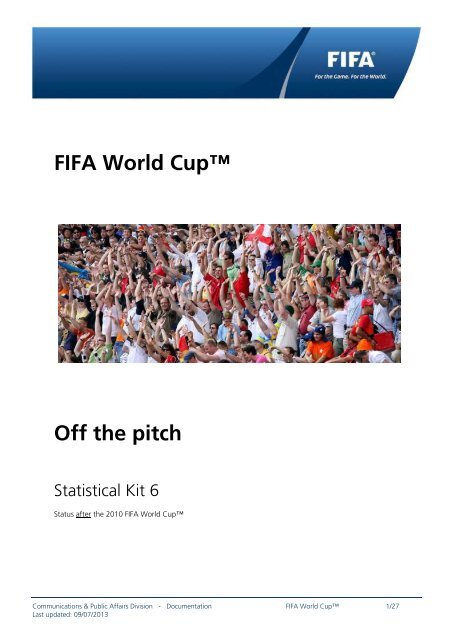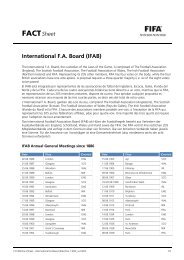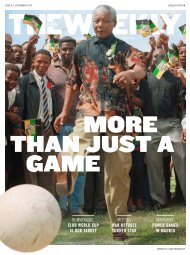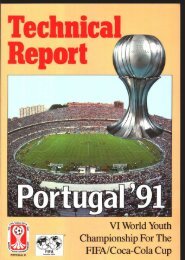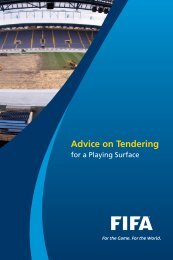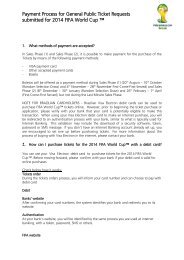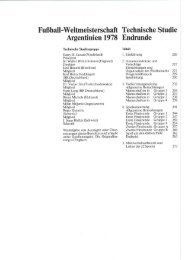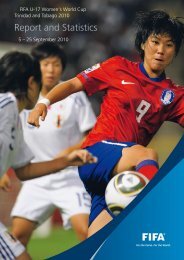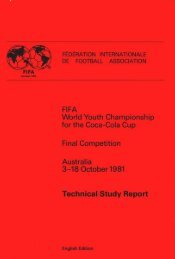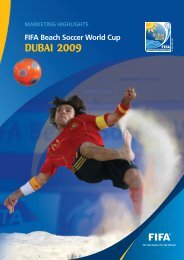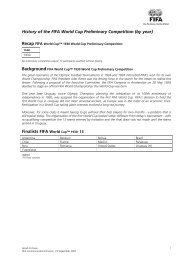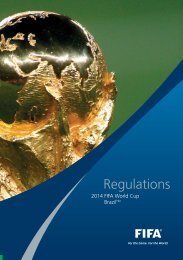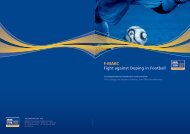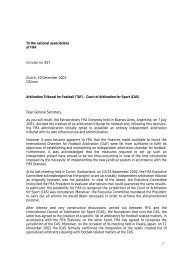Statistical Kit - FIFA World Cup - Off the pitch - status after ... - FIFA.com
Statistical Kit - FIFA World Cup - Off the pitch - status after ... - FIFA.com
Statistical Kit - FIFA World Cup - Off the pitch - status after ... - FIFA.com
Create successful ePaper yourself
Turn your PDF publications into a flip-book with our unique Google optimized e-Paper software.
<strong>FIFA</strong> <strong>World</strong> <strong>Cup</strong><br />
<strong>Off</strong> <strong>the</strong> <strong>pitch</strong><br />
<strong>Statistical</strong> <strong>Kit</strong> 6<br />
Status <strong>after</strong> <strong>the</strong> 2010 <strong>FIFA</strong> <strong>World</strong> <strong>Cup</strong><br />
Communications & Public Affairs Division - Documentation <strong>FIFA</strong> <strong>World</strong> <strong>Cup</strong> 1/27<br />
Last updated: 09/07/2013
Contents<br />
<strong>FIFA</strong> <strong>World</strong> <strong>Cup</strong> Trophy ................................................................................................................................. 3<br />
Trophy details ....................................................................................................................................................................................... 3<br />
Jules Rimet Trophy ............................................................................................................................................ 4<br />
Trophy details ....................................................................................................................................................................................... 4<br />
Awards ............................................................................................................................................................... 5<br />
Overview of <strong>the</strong> <strong>FIFA</strong> <strong>World</strong> <strong>Cup</strong> Awards ........................................................................................................................................... 5<br />
<strong>Off</strong>icial <strong>FIFA</strong> <strong>World</strong> <strong>Cup</strong> Mascot ................................................................................................................... 6<br />
The <strong>FIFA</strong> <strong>World</strong> <strong>Cup</strong> Mascots since 1966 ............................................................................................................................................ 6<br />
<strong>Off</strong>icial <strong>FIFA</strong> <strong>World</strong> <strong>Cup</strong> songs .................................................................................................................... 10<br />
<strong>FIFA</strong> Partners ................................................................................................................................................... 11<br />
The <strong>Off</strong>icial 2014 <strong>FIFA</strong> <strong>World</strong> <strong>Cup</strong> Partners & Sponsors ..................................................................................................................... 11<br />
The <strong>Off</strong>icial <strong>FIFA</strong> <strong>World</strong> <strong>Cup</strong> Partners & Sponsors since 1966 ............................................................................................................. 12<br />
Match Balls ...................................................................................................................................................... 13<br />
Match Balls over <strong>the</strong> years ................................................................................................................................................................... 13<br />
Prize Money ..................................................................................................................................................... 14<br />
Overview since 1982 ........................................................................................................................................................................... 14<br />
TV viewing figures .......................................................................................................................................... 16<br />
Overview by tournament..................................................................................................................................................................... 16<br />
Slots .................................................................................................................................................................. 17<br />
Overview by tournament since 1930 ................................................................................................................................................... 17<br />
Final <strong>com</strong>petition formats .............................................................................................................................. 18<br />
Summary of <strong>the</strong> number of teams qualified since 1930 ........................................................................................................................ 18<br />
Overview of <strong>the</strong> <strong>com</strong>petition formats since 1930 ................................................................................................................................. 19<br />
<strong>FIFA</strong> <strong>World</strong> <strong>Cup</strong> venues since 1930 ............................................................................................................ 22<br />
Summary............................................................................................................................................................................................ 27<br />
Communications & Public Affairs Division - Documentation <strong>FIFA</strong> <strong>World</strong> <strong>Cup</strong> 2/27<br />
Last updated: 09/07/2013
<strong>FIFA</strong> <strong>World</strong> <strong>Cup</strong> Trophy<br />
<strong>FIFA</strong> <strong>com</strong>missioned a new trophy for <strong>the</strong> tenth <strong>FIFA</strong> <strong>World</strong> <strong>Cup</strong> in 1974. A total of 53 designs were submitted<br />
to <strong>FIFA</strong> by experts from seven countries, with <strong>the</strong> final choice being <strong>the</strong> work of Italian artist Silvio Gazzaniga.<br />
He described his creation thus: "The lines spring out from <strong>the</strong> base, rising in spirals, stretching out to receive <strong>the</strong><br />
world. From <strong>the</strong> remarkable dynamic tensions of <strong>the</strong> <strong>com</strong>pact body of <strong>the</strong> sculpture rise <strong>the</strong> figures of two<br />
athletes at <strong>the</strong> stirring moment of victory".<br />
The current <strong>FIFA</strong> <strong>World</strong> <strong>Cup</strong> Trophy cannot be won outright, as <strong>the</strong> regulations state that it shall remain <strong>FIFA</strong>'s<br />
own possession. The <strong>FIFA</strong> <strong>World</strong> <strong>Cup</strong> winners retain it until <strong>after</strong> <strong>the</strong> tournament and are awarded a replica,<br />
gold-plated ra<strong>the</strong>r than solid gold.<br />
Trophy details<br />
Date of manufacture 1973<br />
Weight (g)<br />
6175g (of which 4927g pure gold)<br />
Height (cm) 36<br />
Base (cm) Ø 12.5<br />
Widest point (cm) 15<br />
Material<br />
gold, two rings of malachite stones adorn <strong>the</strong> base<br />
Manufacturer<br />
Bertoni GDE Srl. (design: Silvio Gazzaniga, Italy)<br />
Communications & Public Affairs Division - Documentation <strong>FIFA</strong> <strong>World</strong> <strong>Cup</strong> 3/27<br />
Last updated: 09/07/2013
Jules Rimet Trophy<br />
The first <strong>World</strong> <strong>Cup</strong> trophy, <strong>the</strong> Jules Rimet Trophy, was 35 cm high and weighed approximately 3.8 kg. The<br />
statuette was made of sterling silver and gold plated, with a blue base made of semi-precious stone (lapis lazuli).<br />
It portrayed <strong>the</strong> Goddess of Victory (Nike) holding aloft an eight-sided chalice. There was a gold plate on each of<br />
<strong>the</strong> four sides of <strong>the</strong> base, on which <strong>the</strong> name of <strong>the</strong> trophy as well as <strong>the</strong> names of <strong>the</strong> nine winners between<br />
1930 and 1970 were engraved.<br />
In 1966 <strong>the</strong> cup disappeared while on display as part of <strong>the</strong> build-up to <strong>the</strong> <strong>World</strong> <strong>Cup</strong> in England and was<br />
refound, buried under a tree, by a little dog called Pickles. Finally, in 1983 it was stolen again, this time in Rio de<br />
Janeiro, and never recovered.<br />
Trophy details<br />
Date of manufacture: 1930<br />
Weight (g)<br />
3800g<br />
Height (cm) 35<br />
Base (cm)<br />
7x7<br />
Widest point (cm) 12<br />
Material<br />
gold plated sterling silver, base lapis lazuli<br />
Manufacturer<br />
Abel Lafleur, France<br />
Communications & Public Affairs Division - Documentation <strong>FIFA</strong> <strong>World</strong> <strong>Cup</strong> 4/27<br />
Last updated: 09/07/2013
Awards<br />
Overview of <strong>the</strong> <strong>FIFA</strong> <strong>World</strong> <strong>Cup</strong> Awards<br />
<strong>FIFA</strong> <strong>World</strong> <strong>Cup</strong> Trophy<br />
Winner of <strong>the</strong> final match<br />
adidas Golden/Silver/Bronze Ball<br />
Vote by media (electronic balloting via <strong>FIFA</strong> Media Channel).<br />
This award goes to <strong>the</strong> outstanding player of <strong>the</strong><br />
<strong>com</strong>petition. Members of <strong>the</strong> media can vote for <strong>the</strong> winner<br />
until <strong>the</strong> end of <strong>the</strong> Final through <strong>the</strong> <strong>FIFA</strong> Media Channel.<br />
The vote will close at <strong>the</strong> end of <strong>the</strong> <strong>FIFA</strong> <strong>World</strong> <strong>Cup</strong> Final.<br />
Results will be announced soon <strong>after</strong>.<br />
adidas Golden/Silver/Bronze Boot<br />
adidas Golden Glove (formerly Lev Yashin award)<br />
Hyundai Best Young Player Award<br />
Based on number of goals scored. In case of tie, number of<br />
assists and number of minutes played are taken into account.<br />
Awarded to <strong>the</strong> best goalkeeper as selected by <strong>the</strong> <strong>FIFA</strong><br />
Technical Study Group.<br />
Selected by <strong>the</strong> <strong>FIFA</strong> Technical Study Group.<br />
<strong>FIFA</strong> Fair Play Award<br />
Budweiser Man of <strong>the</strong> Match<br />
The <strong>FIFA</strong> Fair Play Award is awarded to <strong>the</strong> team with <strong>the</strong><br />
best fair play record according to a points system and criteria<br />
established by <strong>the</strong> <strong>FIFA</strong> Committee for Fair Play and Social<br />
Responsibility.<br />
Selected by <strong>the</strong> fans on <strong>FIFA</strong>.<strong>com</strong>. The public will have <strong>the</strong><br />
chance to vote for <strong>the</strong>ir star player on <strong>FIFA</strong>.<strong>com</strong>'s EMIRATES<br />
MatchCast from half-time in each game. The winner of <strong>the</strong><br />
public poll will be announced via <strong>FIFA</strong>.<strong>com</strong>, TV and <strong>the</strong><br />
stadium's giant screen at <strong>the</strong> end of each game.<br />
Communications & Public Affairs Division - Documentation <strong>FIFA</strong> <strong>World</strong> <strong>Cup</strong> 5/27<br />
Last updated: 09/07/2013
<strong>Off</strong>icial <strong>FIFA</strong> <strong>World</strong> <strong>Cup</strong> Mascot<br />
The most recent <strong>FIFA</strong> <strong>World</strong> <strong>Cup</strong> mascot – a three-banded armadillo (<strong>the</strong> Tolypeutes tricinctus) named Fulecowas<br />
officially launched in September 2012.<br />
Fuleco, who was named <strong>after</strong> a nationwide naming contest which attracted 1.7 million Brazilian votes, is a mix<br />
of <strong>the</strong> words “futebol” and “ecologia”, two integral <strong>com</strong>ponents of <strong>the</strong> 2014 <strong>FIFA</strong> <strong>World</strong> <strong>Cup</strong>. The name<br />
perfectly represents <strong>the</strong> way in which <strong>the</strong> two can <strong>com</strong>bine to encourage people to behave in an<br />
environmentally-friendly way.<br />
The final mascot design was chosen <strong>after</strong> <strong>FIFA</strong> and <strong>the</strong> LOC had analysed 47 different proposals created by six<br />
different Brazilian agencies. The designs were fur<strong>the</strong>r analysed through extensive research carried out amongst<br />
its primary target audience, Brazilian children between <strong>the</strong> ages of five and twelve, with <strong>the</strong> favourite being <strong>the</strong><br />
armadillo, created by 100%Design.<br />
The tradition of <strong>the</strong> <strong>Off</strong>icial <strong>FIFA</strong> <strong>World</strong> <strong>Cup</strong> Mascot has been in place for almost 50 years. <strong>World</strong> <strong>Cup</strong> Willie was<br />
<strong>the</strong> first-ever <strong>FIFA</strong> <strong>World</strong> <strong>Cup</strong> Mascot, invented for <strong>the</strong> 1966 tournament in England. <strong>Off</strong>icial Mascots have <strong>com</strong>e<br />
to play a more and more important role in <strong>the</strong> <strong>FIFA</strong> <strong>World</strong> <strong>Cup</strong> as with <strong>the</strong>ir infectiously positive attitude, <strong>the</strong>y<br />
have over <strong>the</strong> years added to <strong>the</strong> atmosphere of each <strong>com</strong>petition in <strong>the</strong>ir own unique way.<br />
The <strong>FIFA</strong> <strong>World</strong> <strong>Cup</strong> Mascots since 1966<br />
Year <strong>FIFA</strong> <strong>World</strong> <strong>Cup</strong> Mascot name Mascot subject<br />
2014 Brazil<br />
Fuleco - a mix of <strong>the</strong> words<br />
“futebol” and “ecologia<br />
A three-banded Brazilian armadillo<br />
Communications & Public Affairs Division - Documentation <strong>FIFA</strong> <strong>World</strong> <strong>Cup</strong> 6/27<br />
Last updated: 09/07/2013
Year <strong>FIFA</strong> <strong>World</strong> <strong>Cup</strong> Mascot name Mascot subject<br />
2010 South Africa Zakumi<br />
Leopard with green hair wearing a shirt with <strong>the</strong> words “South<br />
Africa 2010“."ZA" standing for South Africa and "kumi"<br />
translating into "10" in various languages across Africa<br />
2006 Germany GOLEO IV & Pille<br />
Lion named Goleo wearing a Germany shirt with <strong>the</strong> number 06<br />
and a talking football named Pille.<br />
2002 Korea/Japan Ato, Kaz & Nik (Spheriks)<br />
Spheriks, fantasy <strong>com</strong>puter-generated characters; Coach Ato<br />
and players Nik and Kaz were members of an Atmoball (a<br />
fictional football like sport) team.<br />
Communications & Public Affairs Division - Documentation <strong>FIFA</strong> <strong>World</strong> <strong>Cup</strong> 7/27<br />
Last updated: 09/07/2013
Year <strong>FIFA</strong> <strong>World</strong> <strong>Cup</strong> Mascot name Mascot subject<br />
1998 France Footix<br />
Gallic cockerel, one of <strong>the</strong> national symbols of France, with <strong>the</strong><br />
words "FRANCE 98" on its chest.<br />
1994 USA Striker<br />
Dog wearing a red, white and blue football uniform with <strong>the</strong><br />
words "USA 94".<br />
1990 Italy Ciao<br />
Abstract stick figure with a football head sporting <strong>the</strong> national<br />
colours of Italy.<br />
Communications & Public Affairs Division - Documentation <strong>FIFA</strong> <strong>World</strong> <strong>Cup</strong> 8/27<br />
Last updated: 09/07/2013
Year <strong>FIFA</strong> <strong>World</strong> <strong>Cup</strong> Mascot name Mascot subject<br />
1986 Mexico Pique<br />
Moustachioed chilli pepper with a sombrero hat.<br />
1982 Spain Naranjito Grinning orange wearing <strong>the</strong> Spanish national playing kit.<br />
1978 Argentina Gauchito<br />
Cattle drover holding a small whip in his hand wearing <strong>the</strong><br />
Argentinian blue and white football shirt and a hat with <strong>the</strong><br />
words “ARGENTINA '78”.<br />
1974 Germany FR Tip and Tap<br />
Two boys with rosy cheeks and buck teeth wearing Germany<br />
football kits with <strong>the</strong> letters “WM” (Weltmeisterschaft – <strong>World</strong><br />
<strong>Cup</strong>) and <strong>the</strong> number 74.<br />
1970 Mexico Juanito<br />
A child wearing a sombrero hat pulled down over his face with<br />
<strong>the</strong> words "MEXICO 70".<br />
1966 England <strong>World</strong> <strong>Cup</strong> Willie<br />
Lion, a typical symbol of <strong>the</strong> United Kingdom, wearing a Union<br />
Jack jersey with <strong>the</strong> words "WORLD CUP".<br />
Communications & Public Affairs Division - Documentation <strong>FIFA</strong> <strong>World</strong> <strong>Cup</strong> 9/27<br />
Last updated: 09/07/2013
<strong>Off</strong>icial <strong>FIFA</strong> <strong>World</strong> <strong>Cup</strong> songs<br />
<strong>FIFA</strong> and Sony Music have enjoyed a successful partnership in <strong>the</strong> official music programme ever since 1994. The<br />
tradition of an official song dates back to <strong>the</strong> 1966 <strong>FIFA</strong> <strong>World</strong> <strong>Cup</strong> in England with a song for <strong>the</strong> first <strong>Off</strong>icial<br />
Mascot, “<strong>World</strong> <strong>Cup</strong> Willie”, who was a lion. Ever since, <strong>the</strong> official music programme and <strong>the</strong> <strong>Off</strong>icial Mascot<br />
have be<strong>com</strong>e a more and more significant <strong>com</strong>ponent of <strong>the</strong> event, providing an excellent opportunity for more<br />
than just football fans to identify with <strong>the</strong> world’s biggest single-sport event.<br />
<strong>FIFA</strong> and Sony chose Waka Waka (This Time for Africa) as <strong>the</strong> official song of <strong>the</strong> 2010 <strong>FIFA</strong> <strong>World</strong> <strong>Cup</strong> in<br />
South Africa. The song was written by Shakira, <strong>the</strong> world-famous singer from Latin America, who performed<br />
with South African band Freshlyground.<br />
<strong>Off</strong>icial songs at recent <strong>FIFA</strong> <strong>World</strong> <strong>Cup</strong> <strong>com</strong>petitions have included Un’estate italiana by Edoardo Bennato<br />
and Gianna Nannini in 1990, Gloryland by Daryl Hall with Sounds of Blackness in 1994, and La Copa de la Vida<br />
by Ricky Martin in 1998. In 2002, <strong>the</strong> official song was Boom by Anastacia, while Vangelis’ vocal official an<strong>the</strong>m<br />
featured typical Korean and Japanese sonic elements. In 2006, The Time of Our Lives by <strong>the</strong> Il Divo quartet was a<br />
resounding success.<br />
(source <strong>FIFA</strong>.<strong>com</strong>)<br />
Communications & Public Affairs Division - Documentation <strong>FIFA</strong> <strong>World</strong> <strong>Cup</strong> 10/27<br />
Last updated: 09/07/2013
<strong>FIFA</strong> Partners<br />
The <strong>Off</strong>icial 2014 <strong>FIFA</strong> <strong>World</strong> <strong>Cup</strong> Partners & Sponsors<br />
<strong>FIFA</strong> Partners (6/6)<br />
<strong>FIFA</strong> <strong>World</strong> <strong>Cup</strong> Sponsors (8/8)<br />
National Supporters (6/6)<br />
Adidas<br />
Coca-Cola<br />
Hyundai/Kia Motors<br />
Emirates<br />
Sony<br />
Visa<br />
Budweiser<br />
Castrol<br />
Continental<br />
Johnson & Johnson<br />
McDonald's<br />
Oi<br />
Seara<br />
Yingli<br />
Apex Brazil<br />
Centauro<br />
Garoto<br />
Itaú<br />
Liberty Seguros<br />
Wise Up<br />
<strong>FIFA</strong>'s <strong>com</strong>mercial hierarchy of <strong>the</strong> 2014 <strong>FIFA</strong> <strong>World</strong> <strong>Cup</strong> <strong>com</strong>prises six <strong>FIFA</strong> Partners, eight <strong>FIFA</strong> <strong>World</strong> <strong>Cup</strong> Sponsors and six<br />
National Supporters - all sponsorship slots are occupied.<br />
Communications & Public Affairs Division - Documentation <strong>FIFA</strong> <strong>World</strong> <strong>Cup</strong> 11/27<br />
Last updated: 09/07/2013
2010*<br />
2006<br />
2002<br />
1998<br />
1994<br />
1990<br />
1986<br />
1982<br />
The <strong>Off</strong>icial <strong>FIFA</strong> <strong>World</strong> <strong>Cup</strong> Partners & Sponsors since 1966<br />
adidas x x x x<br />
Alfa Romeo<br />
x<br />
Avaya x x<br />
Bata<br />
x<br />
Budweiser (Anheuser-Busch) (x) x x x x x<br />
Canon x x x x x<br />
Castrol<br />
(x)<br />
Cinzano<br />
x<br />
Coca-Cola x x x x x x x x<br />
Continental (x) x<br />
Deutsche Telekom<br />
x<br />
Emirates x x<br />
Energizer<br />
x<br />
Fuji Xerox<br />
x<br />
Fujifilm x x x x x x x<br />
Gillette x x x x x x x<br />
Hyundai-Kia Motors (2002-2006: Hyundai) x x x<br />
Iveco<br />
x<br />
Johnson & Johnson<br />
(x)<br />
JVC x x x x x x<br />
Korea Telekom/NTT<br />
x<br />
MasterCard x x x x<br />
McDonald's (x) x x x x<br />
Metaxa<br />
x<br />
MTN<br />
(x)<br />
Oi<br />
(x)<br />
Opel (1994: General Motors) x x x<br />
Philips x x x x x x<br />
R.J. Reynolds (1986: Camel/1982: Winston) x x<br />
Satyam<br />
(x)<br />
Seiko x x<br />
Snickers (1990: Mars/m&m’s) x x x<br />
Sony<br />
x<br />
Toshiba x x<br />
Vini d'Italia<br />
x<br />
VISA<br />
x<br />
Yahoo! x x<br />
TOTAL 6 (+8) 15 15 12 11 10 12 9<br />
*<strong>FIFA</strong>'s <strong>com</strong>mercial hierarchy of <strong>the</strong> 2010 <strong>FIFA</strong> <strong>World</strong> <strong>Cup</strong> <strong>com</strong>prised six <strong>FIFA</strong> Partners, eight <strong>FIFA</strong> <strong>World</strong> <strong>Cup</strong> Sponsors and six<br />
National Supporters. In brackets <strong>FIFA</strong> <strong>World</strong> <strong>Cup</strong> Sponsors<br />
Communications & Public Affairs Division - Documentation <strong>FIFA</strong> <strong>World</strong> <strong>Cup</strong> 12/27<br />
Last updated: 09/07/2013
Match Balls<br />
For detailed information on <strong>the</strong> history of <strong>the</strong> <strong>World</strong> <strong>Cup</strong> ball please go to: http://footballs.fifa.<strong>com</strong>/content/view/full/97<br />
Match Balls over <strong>the</strong> years<br />
<strong>World</strong> <strong>Cup</strong> Ball name Manufacturer Material/notes<br />
Brazil 2014<br />
The ball will be launched at <strong>the</strong><br />
Final Draw for <strong>the</strong> 2014 <strong>FIFA</strong><br />
<strong>World</strong> <strong>Cup</strong> Brazil in December<br />
2013.<br />
Brazuca<br />
adidas<br />
South Africa 2010 Jabulani adidas<br />
Following a public vote by over one million<br />
Brazilian football fans, <strong>the</strong> ball will be named<br />
<strong>the</strong> “adidas Brazuca”.<br />
Eight 3-D spherically formed EVA and TPU<br />
panels were moulded toge<strong>the</strong>r, harmoniously<br />
enveloping <strong>the</strong> inner carcass. The result was an<br />
energetic unit <strong>com</strong>bined with perfect<br />
roundness.<br />
Germany 2006 +Teamgeist adidas Revolutionary 14-panel ball configuration<br />
Korea/Japan 2002 Fevernova adidas<br />
France 1998 Tricolore adidas Syntactic foam.<br />
USA 1994 Questra adidas Hi-Tech PU foam<br />
Italy 1990 Etrusco Unico adidas<br />
Mexico 1986 Azteca adidas Fully syn<strong>the</strong>tic<br />
Syntactic foam layer with gas filled microballoons.<br />
3 layer knitted chassis<br />
Fully syn<strong>the</strong>tic and water resistant. Black<br />
polyurethane foam internal layer<br />
Spain 1982 Tango España adidas La<strong>the</strong>r with waterproof sealed seems<br />
Argentina 1978 Tango Riverplate adidas Lea<strong>the</strong>r<br />
Germany 1974 Telstar / Chile adidas Lea<strong>the</strong>r<br />
Mexico 1970 Telstar adidas Lea<strong>the</strong>r<br />
England 1966 25 Challenge Slazenger Lea<strong>the</strong>r<br />
Uruguay 1930-Chile 1962 -<br />
various<br />
Lea<strong>the</strong>r<br />
Communications & Public Affairs Division - Documentation <strong>FIFA</strong> <strong>World</strong> <strong>Cup</strong> 13/27<br />
Last updated: 09/07/2013
Prize Money<br />
Overview since 1982<br />
Year<br />
Host<br />
Total Prize Money (in<br />
million)<br />
Divided as follows<br />
2010 South Africa USD 420<br />
(approx. CHF 456)<br />
winner USD 30 million<br />
runners-up USD 24 million<br />
semi-finalists USD 20 million<br />
quarter-finalists USD 18 million<br />
round of 16 USD 9 million<br />
group stage USD 8 million<br />
+ USD 1 million for each association taking part as<br />
contribution towards team preparation<br />
+ USD 40 million to <strong>the</strong> clubs whose players will take part in<br />
<strong>the</strong> FWC as a contribution to <strong>the</strong>ir participation in <strong>the</strong><br />
<strong>com</strong>petition<br />
2006 Germany CHF 300 winner CHF 24.5 million<br />
runners-up CHF 22.5 million<br />
semi-finalists CHF 21.5 million<br />
quarter-finalists CHF 11.5 million<br />
round of 16 CHF 8.5 million<br />
group stage CHF 6.0 million<br />
+ CHF million for each association taking part as contribution<br />
towards team preparation<br />
+ CHF 15 million for an insurance fund intended to<br />
<strong>com</strong>pensate clubs if any of <strong>the</strong>ir players suffered injury during<br />
<strong>the</strong> FWC finals. Once <strong>com</strong>pensation had been paid out, <strong>the</strong><br />
remaining amount was distributed among <strong>the</strong> associations.<br />
2002 Korea/Japan CHF 199 winner CHF 12.4 million<br />
runners-up CHF 12.15 million<br />
semi-finalists (3 rd /4 th place) CHF 11.9 million<br />
quarter-finalists CHF 7.9 million<br />
round of 16 CHF 6.1 million<br />
group stage CHF 4.5 million<br />
per match/team group stage CHF 1.5 million<br />
per match/team round of 16 CHF 1.6 million<br />
per match/team quarter-final CHF 1.8 million<br />
per match/team semi-final CHF 2.0 million<br />
per match/team march for 3 rd place CHF 2.0 million<br />
final game (2 nd place) CHF 2.25 million<br />
final game (1 st place) CHF 2.5 million<br />
+ CHF 1 million for each association taking part as<br />
contribution towards team preparation<br />
Communications & Public Affairs Division - Documentation <strong>FIFA</strong> <strong>World</strong> <strong>Cup</strong> 14/27<br />
Last updated: 09/07/2013
Overview since 1982 ctd.<br />
Year Host Total Prize Money Divided as follows<br />
1998 France CHF 133 per match/team CHF 1.038 million<br />
+ CHF 0.75 million for each association taking part as<br />
contribution towards team preparation<br />
1994 USA CHF 87 per match/team CHF 835’701<br />
+ CHF 0.7 million for each association taking part as<br />
contribution towards team preparation<br />
1990 Italy CHF 70 Per match/team CHF 677’127<br />
+ CHF 0.6 million for each association taking part as<br />
contribution towards team preparation<br />
1986 Mexico CHF 50 Per match/team CHF 481’539<br />
1982 Spain CHF 42 Per round/team approx. CHF 1 million<br />
Communications & Public Affairs Division - Documentation <strong>FIFA</strong> <strong>World</strong> <strong>Cup</strong> 15/27<br />
Last updated: 09/07/2013
TV viewing figures<br />
Overview by tournament<br />
<strong>FIFA</strong> <strong>World</strong> <strong>Cup</strong> Final<br />
Competition<br />
Broadcast<br />
countries<br />
Total transmission time<br />
(H) – in 000’s<br />
*Cumulative TV viewing<br />
audiences<br />
2006 - total 214 73 ~26.3 billion<br />
Europe 46 19.5 5.3<br />
North America & Caribbean 38 10.5 0.8<br />
Central & South America 17 8.5 3.9<br />
Africa 58 17.3 5.0<br />
Middle East 15 2.1 0.8<br />
Asia 31 13.1 8.3<br />
Pacific 9 2.0 0.06<br />
Out of home viewing 2.1<br />
2002 - total 213 41 ~28.8 billion<br />
Europe 58 11.0 4.1<br />
North America & Caribbean 37 7.5 0.4<br />
Central & South America 17 5.1 4.3<br />
Africa 55 7.4 5.2<br />
Middle East 14 1.9 1.0<br />
Asia 23 7.3 11.2<br />
Pacific 9 0.8 0.09<br />
Out of home viewing 2.5<br />
1998 - total 196 29 ~24.8 billion<br />
Europe 58 6.7 6.4<br />
North America & Caribbean 21 3.3 0.4<br />
Central & South America 20 5.4 4.5<br />
Africa 53 6.3 5.3<br />
Middle East 13 1.6 2.3<br />
Asia 23 4.7 5.8<br />
Pacific 8 1.0 0.04<br />
*The sum of <strong>the</strong> audiences of each individual <strong>FIFA</strong> <strong>World</strong> <strong>Cup</strong> programme<br />
Communications & Public Affairs Division - Documentation <strong>FIFA</strong> <strong>World</strong> <strong>Cup</strong> 16/27<br />
Last updated: 09/07/2013
Slots<br />
Overview by tournament since 1930<br />
European<br />
Zone<br />
South<br />
American<br />
Zone<br />
African Zone<br />
North,<br />
Central<br />
American &<br />
Caribbean<br />
Zone<br />
Asian Zone<br />
Oceanian<br />
Zone<br />
2014 13 5.5 5 3.5 4.5 0.5 32<br />
2010 13 5 (4.5) 6 3 (3.5) 4 (4.5) 1 (0.5) 32<br />
2006 14 4 (4.5) 5 4 (3.5) 4 (4.5) 1 (0.5) 32<br />
2002 15 (14.5) 5 (4.5) 5 3 4 (4.5) 0 (0.5) 32<br />
1998 15 5 5 3 4 (3.5) 0 (0.5) 32<br />
1994 13 4 (3.5) 3 2 (2.25) 2 0 (0.25) 24<br />
1990 14 4 (3.5) 2 2 2 0 (0.5) 24<br />
1986 14 (13.5) 4 2 2 2 0 (0.5) 24<br />
1982 14 4 2 2 1 (1) 1 (1) 24<br />
1978 10 (10.5) 3 (3.5) 1 1 1 (0.5) 0 (0.5) 16<br />
1974 9 (9.5) 4 (3.5) 1 1 0 (0.5) 1 (0.5) 16<br />
1970 9 3 1 2 1 16<br />
1966 10 4 1 1 16<br />
1962 10 5 1 16<br />
1958 12 (11.5) 3 * 1 * 16<br />
1954 12 2 1 1 16<br />
1950 6 5 2 13<br />
1938 12 1 1 1 15<br />
1934 12 2 1 1 16<br />
1930 4 7 2 13<br />
Due to <strong>the</strong> later foundation of <strong>the</strong> confederations, <strong>the</strong> teams participating in <strong>the</strong> early editions of <strong>the</strong> <strong>FIFA</strong> <strong>World</strong> <strong>Cup</strong> were<br />
not officially affiliated to any superior organisation, and groupings were loosely based on geographical and continental<br />
boundaries.<br />
* 1958 saw a play-off between Wales and Israel, with Israel categorised under <strong>the</strong> "Asia/Africa" group. Therefore 0.5 of a<br />
slot belonged jointly to Asia/Africa, although ultimately nei<strong>the</strong>r continent sent any representatives.<br />
Number of slots before <strong>the</strong> play-offs in brackets<br />
TOTAL<br />
Communications & Public Affairs Division - Documentation <strong>FIFA</strong> <strong>World</strong> <strong>Cup</strong> 17/27<br />
Last updated: 09/07/2013
Final <strong>com</strong>petition formats<br />
Summary of <strong>the</strong> number of teams qualified since 1930<br />
Host<br />
Finalists<br />
Host<br />
automatically<br />
qualified<br />
Defending<br />
champions<br />
automatically<br />
qualified<br />
Teams qualified<br />
by preliminary<br />
<strong>com</strong>petition<br />
2014 Brazil 32 1 0 31<br />
2010 South Africa 32 1 0 31<br />
2006 Germany 32 1 0 31<br />
2002 Japan/Korea 32 2 1 29<br />
1998 France 32 1 1 30<br />
1994 USA 24 1 1 22<br />
1990 Italy 24 1 1 22<br />
1986 Mexico 24 1 1 22<br />
1982 Spain 24 1 1 22<br />
1978 Argentina 16 1 1 14<br />
1974 Germany FR 16 1 1 14<br />
1970 Mexico 16 1 1 14<br />
1966 England 16 1 1 14<br />
1962 Chile 16 1 1 14<br />
1958 Sweden 16 1 1 14<br />
1954 Switzerland 16 1 1 14<br />
1950 Brazil 13 1 1 11<br />
1938 France 15 1 1 14<br />
1934 Italy 16 0 0 16<br />
1930 Uruguay 13 no preliminary <strong>com</strong>petition, teams entered by invitation<br />
Communications & Public Affairs Division - Documentation <strong>FIFA</strong> <strong>World</strong> <strong>Cup</strong> 18/27<br />
Last updated: 09/07/2013
Overview of <strong>the</strong> <strong>com</strong>petition formats since 1930<br />
<strong>FIFA</strong> <strong>World</strong> <strong>Cup</strong> Brazil 2014, South Africa 2010 & Germany 2006<br />
- 32 finalists<br />
- 31 teams qualify by preliminary <strong>com</strong>petition (<strong>the</strong> current <strong>World</strong> <strong>Cup</strong> holder will not automatically qualify)<br />
- Host automatically qualified<br />
- Eight groups of four teams (top two in each group qualify for <strong>the</strong> knock-out stage in <strong>the</strong> second round (round of 16),<br />
<strong>the</strong> final matches in each group were played simultaneously)<br />
- Round of 16 (knock-out stage, winners proceed to quarter-finals - in a case of a draw <strong>after</strong> extra time penalty shoot-outs<br />
will be used to decide)<br />
- Quarter-finals (knock-out stage)<br />
- Semi-finals<br />
- Third-place play-off<br />
- Final<br />
<strong>FIFA</strong> <strong>World</strong> <strong>Cup</strong> Korea/Japan 2002<br />
- 32 finalists<br />
- 29 teams qualify by preliminary <strong>com</strong>petition<br />
- Both hosts and <strong>World</strong> <strong>Cup</strong> holder automatically qualified<br />
- Eight groups of four teams (top two in each group qualify for <strong>the</strong> knock-out stage in <strong>the</strong> second round (round of 16),<br />
<strong>the</strong> final matches in each group were played simultaneously)<br />
- Round of 16 (knock-out stage, winners proceed to quarter-finals - in a case of a draw <strong>after</strong> extra time penalty shoot-outs<br />
will used to decide)<br />
- Quarter-finals (knock-out stage)<br />
- Semi-finals<br />
- Third-place play-off<br />
- Final<br />
<strong>FIFA</strong> <strong>World</strong> <strong>Cup</strong> France 1998<br />
- 32 finalists<br />
- 30 teams qualified by preliminary <strong>com</strong>petition<br />
- Host and <strong>World</strong> <strong>Cup</strong> holder automatically qualified<br />
- Eight groups of four teams (top two in each group qualified for <strong>the</strong> knock-out stage in <strong>the</strong> second round (round of 16),<br />
<strong>the</strong> final matches in each group were played simultaneously)<br />
- Round of 16 (knock-out stage, winners proceeding to quarter-finals - in a case of a draw <strong>after</strong> extra time penalty shootouts<br />
were used to decide)<br />
- Quarter-finals (knock-out stage)<br />
- Semi-finals<br />
- Third-place play-off<br />
- Final<br />
<strong>FIFA</strong> <strong>World</strong> <strong>Cup</strong> USA 1994, Italy 1990 & Mexico 1986<br />
- 24 finalists<br />
- 22 teams qualified by preliminary <strong>com</strong>petition<br />
- Host and <strong>World</strong> <strong>Cup</strong> holder automatically qualified<br />
- Six groups of four teams (top two in each group qualified for <strong>the</strong> knock-out stage in <strong>the</strong> second round (round of 16),<br />
toge<strong>the</strong>r with <strong>the</strong> four best third-placed teams, <strong>the</strong> final matches in each group were played simultaneously)<br />
- Round of 16 (knock-out stage, winners proceeding to quarter-finals - in a case of a draw <strong>after</strong> extra time penalty shootouts<br />
were used to decide)<br />
- Quarter-finals (knock-out stage)<br />
- Semi-finals<br />
- Third-place play-off<br />
- Final<br />
Communications & Public Affairs Division - Documentation <strong>FIFA</strong> <strong>World</strong> <strong>Cup</strong> 19/27<br />
Last updated: 09/07/2013
<strong>FIFA</strong> <strong>World</strong> <strong>Cup</strong> Spain 1982<br />
- 24 finalists<br />
- 22 teams qualified by preliminary <strong>com</strong>petition<br />
- Host and <strong>World</strong> <strong>Cup</strong> holder automatically qualified<br />
- Six groups of four (top two teams progressing in to four fur<strong>the</strong>r groups of three)<br />
- Four groups of three (group winners progressing to a semi-final knock-out stage)<br />
- Semi-finals<br />
- Third-place play-off<br />
- Final<br />
<strong>FIFA</strong> <strong>World</strong> <strong>Cup</strong> Argentina 1978 & Germany FR 1974<br />
- 16 finalists<br />
- 14 teams qualified by preliminary <strong>com</strong>petition<br />
- Host and <strong>World</strong> <strong>Cup</strong> holder automatically qualified<br />
- Four groups of four teams (first two teams progressed into two quarter-final groups – separated by goal-difference)<br />
- Two quarter-final groups (with <strong>the</strong> winners be<strong>com</strong>ing <strong>the</strong> finalists and <strong>the</strong> runners-up meeting in a third-place play-off)<br />
- Third-place play-off<br />
- Final<br />
<strong>FIFA</strong> <strong>World</strong> <strong>Cup</strong> Mexico 1970, England 1966 & Chile 1962<br />
- 16 finalists<br />
- 14 teams qualified by preliminary <strong>com</strong>petition<br />
- Host and <strong>World</strong> <strong>Cup</strong> holder automatically qualified<br />
- Four groups of four teams (first two teams progressed to quarterfinals - separated for <strong>the</strong> first time by goal- difference)<br />
- Quarter-finals (knock-out stage)<br />
- Semi-finals<br />
- Third-place play-off<br />
- Final<br />
<strong>FIFA</strong> <strong>World</strong> <strong>Cup</strong> Sweden 1958<br />
- 16 finalists<br />
- 14 teams qualified by preliminary <strong>com</strong>petition<br />
- Host and <strong>World</strong> <strong>Cup</strong> holder automatically qualified<br />
- Four first round pools, winner and second place of each pool progressed to <strong>the</strong> quarter finals (in a case of equal points a<br />
play-off game was played to decide)<br />
- Quarter finals (knock-out stage)<br />
- Semi-finals<br />
- Third-place play-off<br />
- Final<br />
<strong>FIFA</strong> <strong>World</strong> <strong>Cup</strong> Switzerland 1954<br />
- 16 finalists<br />
- 14 teams qualifying by preliminary <strong>com</strong>petition<br />
- Host and <strong>World</strong> <strong>Cup</strong> holder automatically qualified<br />
- Four first round pools, (with two seeded teams per pool) winner and second placed team of each pool progressed to <strong>the</strong><br />
quarter finals<br />
- Quarter-finals (knock-out stage)<br />
- Semi-finals<br />
- Final<br />
Communications & Public Affairs Division - Documentation <strong>FIFA</strong> <strong>World</strong> <strong>Cup</strong> 20/27<br />
Last updated: 09/07/2013
-<br />
<strong>FIFA</strong> <strong>World</strong> <strong>Cup</strong> Brazil 1950<br />
- 13 finalists<br />
- 11 teams qualifying by preliminary <strong>com</strong>petition<br />
- Host and <strong>World</strong> <strong>Cup</strong> holder automatically qualified<br />
- Two pools of four teams, one pool of three teams, one pool of two teams<br />
- Winner of each pool progressed to final pool where all <strong>the</strong> teams played each o<strong>the</strong>r once<br />
- First of <strong>the</strong> pool was <strong>the</strong> <strong>World</strong> <strong>Cup</strong> winner<br />
<strong>FIFA</strong> <strong>World</strong> <strong>Cup</strong> France 1938<br />
- 16 finalists<br />
- 14 teams qualifying by preliminary <strong>com</strong>petition<br />
- Host and <strong>World</strong> <strong>Cup</strong> holder automatically qualified - only 15 finally entered, giving Sweden a bye to <strong>the</strong> second round<br />
- First round (knock-out stage), eight teams proceeded to second round (in case of a draw <strong>the</strong> game was replayed)<br />
- Second round (knock-out stage), four teams proceeded to semi-finals (in case of a draw <strong>the</strong> game was replayed)<br />
- Semi-finals<br />
- Third-place play-off<br />
- Final<br />
<strong>FIFA</strong> <strong>World</strong> <strong>Cup</strong> Italy 1934<br />
- 16 finalists<br />
- 16 teams qualifying by preliminary <strong>com</strong>petition (host also had to qualify!)<br />
- First round (knock-out stage), eight teams proceed to second round (in case of a draw <strong>the</strong> game was replayed)<br />
- Second round (knock-out stage), four teams proceed to semi-finals (in case of a draw <strong>the</strong> game was replayed)<br />
- Semi-finals<br />
- Third-place play-off<br />
- Final<br />
<strong>FIFA</strong> <strong>World</strong> <strong>Cup</strong> Uruguay 1930<br />
- 13 finalists (no preliminary <strong>com</strong>petition, teams entered by invitation)<br />
- Three pools of three teams, one pool of four teams (winner of each pool progressed to <strong>the</strong> semi-final knock-out stage)<br />
- Semi-finals<br />
- Final<br />
Communications & Public Affairs Division - Documentation <strong>FIFA</strong> <strong>World</strong> <strong>Cup</strong> 21/27<br />
Last updated: 09/07/2013
<strong>FIFA</strong> <strong>World</strong> <strong>Cup</strong> venues since 1930<br />
2014/Brazil cities: 12 / stadiums: 12<br />
Rio de Janeiro (final) Estadio Do Maracana capacity: 76,935<br />
Belo Horizonte<br />
Estadio Mineirao<br />
Brasília<br />
Estadio Nacional de Brasilia<br />
Cuiabá<br />
Arena Pantanal<br />
Curitiba<br />
Arena da Baixada<br />
Fortaleza<br />
Estadio Castelao<br />
Manaus<br />
Arena Amazonia<br />
Natal<br />
Estadio das Dunas<br />
Porto Alegre<br />
Estadio Beira.Rio<br />
Recife<br />
Arena Pernambuco<br />
Salvador<br />
Arena Fonte Nova<br />
São Paulo<br />
Arena de São Paulo<br />
2010/South Africa cities: 9 / stadiums: 10<br />
Johannesburg (final) Soccer City Stadium (JSC) capacity: 84,490<br />
Mangaung/Bloemfontein<br />
Free State Stadium<br />
Cape Town<br />
Green Point Stadium<br />
Durban<br />
Durban Stadium<br />
Johannesburg<br />
Ellis Park Stadium (JEP)<br />
Nelspruit<br />
Mbombela Stadium<br />
Polokwane<br />
Peter Mokaba Stadium<br />
Nelson Mandela Bay/Port Elizabeth<br />
Nelson Mandela Bay Stadium<br />
Tshwane/Pretoria<br />
Loftus Versfeld Stadium<br />
Rustenburg<br />
Royal Bafokeng Stadium<br />
2006/Germany cities: 12 / stadiums: 12<br />
Berlin (final) Olympiastadion capacity: 69,000<br />
Cologne<br />
<strong>FIFA</strong> <strong>World</strong> <strong>Cup</strong> Stadium<br />
Dortmund<br />
<strong>FIFA</strong> <strong>World</strong> <strong>Cup</strong> Stadium<br />
Frankfurt<br />
<strong>FIFA</strong> <strong>World</strong> <strong>Cup</strong> Stadium<br />
Gelsenkirchen<br />
<strong>FIFA</strong> <strong>World</strong> <strong>Cup</strong> Stadium<br />
Hamburg<br />
<strong>FIFA</strong> <strong>World</strong> <strong>Cup</strong> Stadium<br />
Hanover<br />
<strong>FIFA</strong> <strong>World</strong> <strong>Cup</strong> Stadium<br />
Kaiserslautern<br />
Fritz-Walter-Stadion<br />
Leipzig<br />
Zentralstadion<br />
Munich<br />
<strong>FIFA</strong> <strong>World</strong> <strong>Cup</strong> Stadium<br />
Nuremberg<br />
Franken-Stadion<br />
Stuttgart<br />
Gottlieb-Daimler-Stadion<br />
Communications & Public Affairs Division - Documentation <strong>FIFA</strong> <strong>World</strong> <strong>Cup</strong> 22/27<br />
Last updated: 09/07/2013
2002/Korea/Japan cities: 20 (10/10) / stadiums: 20 (10/10)<br />
Korea cities 10 / stadiums: 10<br />
Busan<br />
Busan Asiad Main Stadium<br />
Daegu<br />
Daegu <strong>World</strong> <strong>Cup</strong> Stadium<br />
Daejeon<br />
Daejeon <strong>World</strong> <strong>Cup</strong> Stadium<br />
Gwangju<br />
Gwangju <strong>World</strong> <strong>Cup</strong> Stadium<br />
Incheon<br />
Incheon Munhak Stadium<br />
Jeonju<br />
Jeonju <strong>World</strong> <strong>Cup</strong> Stadium<br />
Seogwipo<br />
Jeju <strong>World</strong> <strong>Cup</strong> Stadium<br />
Seoul<br />
Seoul <strong>World</strong> <strong>Cup</strong> Stadium<br />
Suwon<br />
Suwon <strong>World</strong> <strong>Cup</strong> Stadium<br />
Ulsan<br />
Munsu Football Stadium<br />
Japan cities: 10 / stadiums: 10<br />
Yokohama (final) International Stadium Yokohama capacity: 69,029<br />
Ibaraki<br />
Kashima Stadium<br />
Kobe<br />
Kobe Wing Stadium<br />
Miyagi<br />
Miyagi Stadium<br />
Niigata<br />
Niigata Stadium Big Swan<br />
Oita<br />
Oita Stadium Big Eye<br />
Osaka<br />
Osaka Nagai Stadium<br />
Saitama Saitama Stadium 2002<br />
Sapporo<br />
Sapporo Dome<br />
Shizuoka<br />
Shizuoka Stadium ECOPA<br />
1998/France cities: 10 / stadiums: 10<br />
St. Denis (final) Stade de France capacity: 80,000<br />
Bordeaux<br />
Parc Lescure<br />
Lens<br />
Félix-Bollaert<br />
Lyon<br />
Gerland<br />
Marseille<br />
Stade-Vélodrome<br />
Montpellier<br />
La Mosson<br />
Nantes<br />
La Beaujoire<br />
Paris<br />
Parc des Princes<br />
St. Etienne<br />
Geoffrey-Guichard<br />
Toulouse<br />
Stade Municipal<br />
1994/USA cities: 9 / stadiums: 9<br />
Los Angeles (final) Rose Bowl capacity: 94,194<br />
Boston<br />
Foxboro<br />
Chicago<br />
Soldier Field<br />
Dallas<br />
Cotton Bowl<br />
Detroit<br />
Pontiac Silverdome<br />
New York<br />
Giants Stadium<br />
Orlando<br />
Citrus Bowl<br />
San Francisco<br />
Stanford<br />
Washington<br />
RFK Stadium<br />
Communications & Public Affairs Division - Documentation <strong>FIFA</strong> <strong>World</strong> <strong>Cup</strong> 23/27<br />
Last updated: 09/07/2013
1990/Italy cities: 12 / stadiums: 12<br />
Rome (final) Olimpico capacity: 73,603<br />
Bari<br />
San Nicola<br />
Bologna<br />
Renato Dall’Ara<br />
Cagliari<br />
Sant ‘Elia<br />
Florence<br />
Comunale<br />
Genoa<br />
Luigi Ferraris<br />
Milan<br />
Giuseppe Meazza<br />
Naples<br />
San Paolo<br />
Palermo<br />
Della Favorita<br />
Turin<br />
Delle Alpi<br />
Udine<br />
Friuli<br />
Verona<br />
Marc Antonio Bentegodi<br />
1986/Mexico cities: 9 / stadiums: 12<br />
Mexico City (final) Azteca capacity: 114,600<br />
Guadalajara<br />
Jalisco<br />
Guadalajara<br />
Tres de Marzo<br />
Irapuato<br />
Estadio Irapuato<br />
León<br />
Nou Camp<br />
Mexico City Olimpico 68<br />
Monterrey<br />
Tecnológico<br />
Monterrey<br />
Universitario<br />
Nezahualcoyotl Neza 86<br />
Puebla<br />
Cuauhtemoc<br />
Querétaro<br />
La Corregidora<br />
Toluca<br />
Bombonera<br />
1982/Spain cities: 14 / stadiums: 17<br />
Madrid (final) Bernabéu capacity: 90,000<br />
Alicante<br />
José Rico Perez<br />
Barcelona<br />
Nou Camp<br />
Barcelona<br />
Sarria<br />
Bilbao<br />
San Mamés<br />
Elche<br />
Nuevo Estadio<br />
Gijon<br />
El Molinón<br />
La Coruña<br />
Riazor<br />
Madrid<br />
Vicente Calderón<br />
Málaga<br />
La Rosaleda<br />
Oviedo<br />
Carlos Tartiere<br />
Seville<br />
Benito Villamarín<br />
Seville<br />
Sánchez Pizjuán<br />
Valencia<br />
Luis Casanova<br />
Valladolid<br />
José Zorrilla<br />
Vigo<br />
Balaidos<br />
Zaragoza<br />
La Romereda<br />
Communications & Public Affairs Division - Documentation <strong>FIFA</strong> <strong>World</strong> <strong>Cup</strong> 24/27<br />
Last updated: 09/07/2013
1978/Argentina cities: 5 / stadiums: 6<br />
Buenos Aires (final) Estadio Monumental Antonio Vespucio Liberti capacity: 71,483<br />
Buenos Aires<br />
Jose Amalfitani<br />
Cordoba<br />
Chateau Carreras<br />
Mar del Plata<br />
Parque Municipal<br />
Mendoza<br />
San Martin<br />
Rosario<br />
Cordiviola<br />
1974/Germany FR cities: 9 / stadiums: 9<br />
Munich (final) Olympiastadion capacity: 75,200<br />
Berlin West<br />
Olympiastadion<br />
Dortmund<br />
Westfalenstadion<br />
Dusseldorf<br />
Rheinstadion<br />
Frankfurt/Main<br />
Waldstadion<br />
Gelsenkirchen<br />
Parkstadion<br />
Hamburg<br />
Volksparkstadion<br />
Hanover<br />
Niedersachsenstadion<br />
Stuttgart<br />
Neckarstadion<br />
1970/Mexico cities: 5 / stadiums: 5<br />
Mexico City (final) Azteca capacity: 107,412<br />
Guadalajara<br />
Jalisco<br />
León<br />
Guanajuato<br />
Puebla<br />
Cuauhtemoc<br />
Toluca<br />
Luis Dosal<br />
1966/England cities: 7 / stadiums: 8<br />
London (final) Wembley capacity: 93,000<br />
Birmingham<br />
Villa Park<br />
Liverpool<br />
Goodison Park<br />
London<br />
White City<br />
Manchester<br />
Old Trafford<br />
Middlesbrough<br />
Ayresome Park<br />
Sheffield<br />
Hillsborough<br />
Sunderland<br />
Roker Park Ground<br />
1962/Chile cities: 4 / stadiums: 4<br />
Santiago de Chile (final) Nacional capacity: 69,000<br />
Arica<br />
Carlos Dittborn<br />
Rancagua<br />
Estadio Braden<br />
Viña del Mar<br />
Sausalito<br />
1958/Sweden cities: 12 / stadiums: 12<br />
Solna (final) Rasunda capacity: 51,800<br />
Boras<br />
Ryavallen<br />
Eskilstuna<br />
Tunavallen<br />
Go<strong>the</strong>nburg<br />
Nya Ullevi<br />
Halmstad<br />
Orjans Vall<br />
Helsingborg<br />
Olympia Stadium<br />
Malmo<br />
Malmoe FF<br />
Norrkoepping<br />
Idrottsparken<br />
Ørebro<br />
Eyravallen<br />
Sandviken<br />
Jarnvallen<br />
Udevalla<br />
Rimnersvallen<br />
Västeras<br />
Arosvallen<br />
Communications & Public Affairs Division - Documentation <strong>FIFA</strong> <strong>World</strong> <strong>Cup</strong> 25/27<br />
Last updated: 09/07/2013
1954/Switzerland cities: 6 / stadiums: 6<br />
Berne (final) Wankdorf-Stadion capacity: 60,000<br />
Basel<br />
St.-Jakob-Park<br />
Geneva<br />
Stades-les-Charmilles<br />
Lausanne<br />
La Pontaise<br />
Lugano<br />
Comunale di Cornaredo<br />
Zurich<br />
Hardturm<br />
1950/Brazil cities: 6 / stadiums: 6<br />
Belo Horizonte<br />
Independencia<br />
Curitiba<br />
Durival de Brito<br />
Pôrto Alegre<br />
Eucaliptos<br />
Recife<br />
Estadio Ilha do Retiro<br />
Rio de Janeiro<br />
Estadio do Maracanã<br />
São Paulo<br />
Pacaembu<br />
1938/France cities: 9 / stadiums: 10<br />
Paris (final) Stade Olympique de Colombes capacity: 45,000<br />
Antibes<br />
Fort Carrée<br />
Bordeaux<br />
Parc Lescure<br />
Le Havre<br />
Cavée Verte<br />
Lille<br />
Victor Boucquey<br />
Marseilles<br />
Vélodrome<br />
Paris<br />
Parc des Princes<br />
Reims<br />
Stade Vélodrome Municipale<br />
Strasbourg<br />
Meinau<br />
Toulouse<br />
Chapou<br />
1934/Italy cities: 8 / stadiums: 8<br />
Rome (final) Nazionale del P.N.F. capacity: 50,000<br />
Bologna<br />
Stadio del Littorale<br />
Florence<br />
Giovanni Berta<br />
Genoa<br />
Luigi Ferraris<br />
Milan<br />
San Siro<br />
Naples<br />
Giorgio Ascarelli<br />
Turin<br />
Benito Mussolini<br />
Trieste<br />
Stadio del Littorio<br />
1930/Uruguay city: 1 / stadiums: 3<br />
Montevideo (final) Estadio Centenario capacity: 80,000<br />
Montevideo<br />
Estadio Parque Central<br />
Montevideo<br />
Estadio Pocitos<br />
Communications & Public Affairs Division - Documentation <strong>FIFA</strong> <strong>World</strong> <strong>Cup</strong> 26/27<br />
Last updated: 09/07/2013
Summary<br />
Host Cities Stadiums<br />
2014 Brazil 12 12<br />
2010 South Africa 9 10<br />
2006 Germany 12 12<br />
2002 Korea/Japan 20 (10/10) 20 (10/10)<br />
1998 France 10 10<br />
1994 USA 9 9<br />
1990 Italy 12 12<br />
1986 Mexico 9 12<br />
1982 Spain 14 17<br />
1978 Argentina 5 6<br />
1974 Germany FR 9 9<br />
1970 Mexico 5 5<br />
1966 England 7 8<br />
1962 Chile 4 4<br />
1958 Sweden 12 12<br />
1954 Switzerland 6 6<br />
1950 Brazil 6 6<br />
1938 France 9 10<br />
1934 Italy 8 8<br />
1930 Uruguay 1 3<br />
Communications & Public Affairs Division - Documentation <strong>FIFA</strong> <strong>World</strong> <strong>Cup</strong> 27/27<br />
Last updated: 09/07/2013


